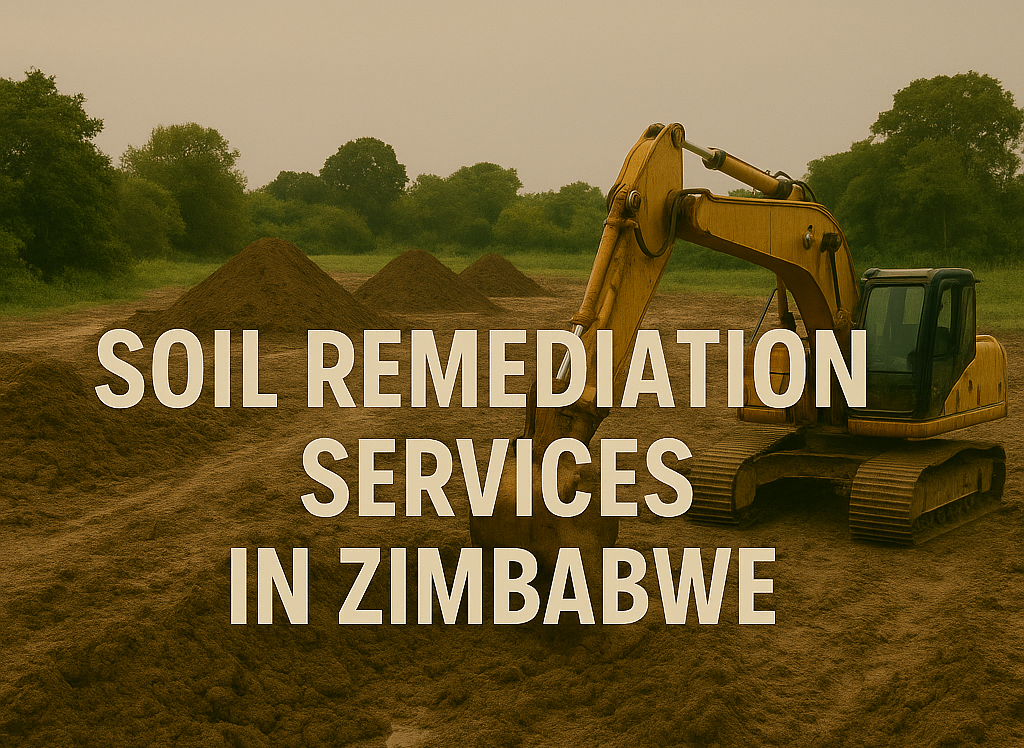Restoring Land and Safeguarding Water
Introduction
Zimbabwe, with its fertile farmlands, rich mineral resources, and growing urban centers, is facing an increasingly urgent environmental challenge Soil Remediation Services in Zimbabwe soil and groundwater contamination. Agriculture remains the backbone of the economy, while mining and industrial activities continue to expand. However, decades of unsustainable farming practices, unregulated mining, and rapid urban growth have placed significant pressure on the country’s soils and limited freshwater reserves. From pesticide and fertilizer runoff in the Mazowe Valley to heavy metal pollution in mining towns, contamination now threatens food security, public health, and long-term economic stability.
At The Ground Water Company, we provide specialized soil remediation services across Zimbabwe. Our mission is to rehabilitate contaminated land, protect aquifers, and support industries, municipalities, and communities in meeting environmental standards while contributing to Zimbabwe’s vision of sustainable development.
What Is Soil Remediation?
Soil remediation is the process of cleaning up and restoring contaminated soil to make it safe for people, plants, and animals. It’s commonly used at sites where industrial activities, chemical spills, or improper waste disposal have polluted the ground.
In Zimbabwe, the most common soil contaminants include:
- Petroleum hydrocarbons – from transport corridors, depots, and industrial activity
- Heavy metals – from gold, platinum, and chrome mining operations
- Chemical residues – from pesticides, fertilizers, and untreated industrial waste
- Salinity and nitrates – caused by over-irrigation and poor water management in semi-arid regions
Soil Contamination Challenges in Zimbabwe
Zimbabwe’s geography, economy, and development patterns create distinct contamination risks:
- Mining Legacy – Gold and platinum mining have left behind tailings and heavy metal contamination affecting both soil and aquifers.
- Industrial Activity – Harare, Bulawayo, and other cities face challenges from untreated waste, fuel spills, and chemical discharges.
- Urban Growth – Rising populations in major towns increase pressure on waste management systems, causing soil degradation.
- Agricultural Practices – Excessive fertilizer and pesticide use in commercial farming regions reduces soil fertility and contaminates water.
- Water Scarcity – With recurrent droughts, contamination of limited groundwater sources has severe consequences for communities and farming.
Our Soil Remediation Services in Zimbabwe
At GWC, we deliver tailored remediation programs suited to Zimbabwe’s environmental realities
1 Site Assessment & Soil Testing
Soil sampling and analysis to identify contaminants
Risk assessment for human health and environment
Geotechnical surveys to understand soil structure
2 Excavation & Disposal
Removal of contaminated soil
Transport to licensed disposal facilities
Landfill management or off-site treatment
3.In-Situ Remediation Services
Bioremediation (using microbes or plants)
Chemical oxidation/reduction
Soil vapor extraction
Phytoremediation
4.Ex-Situ Remediation Services
Soil washing
Thermal desorption
Stabilization
5.Water Treatment
Pump and treat systems
Permeable reactive barriers
Containment systems
6.Monitoring & Reporting
Post-remediation soil testing
Environmental monitoring
Regulatory reporting and documentation
Why Soil Remediation Matters in Zimbabwe
- Protects Groundwater Security – Ensures safe aquifers for both rural communities and growing cities
- Restores Agricultural Productivity – Keeps farmland fertile in a nation where agriculture sustains millions
- Supports National Goals – Aligns with Zimbabwe’s environmental protection and sustainability agenda
- Ensures Compliance – Meets local environmental regulations and international best practices
- Safeguards Public Health – Reduces exposure to toxins and strengthens soil quality for communities and farms
Other Ground water Services We Provide in Zimbabwe
Beyond soil remediation, GWC offers a full suite of groundwater services:
- Ground water exploration
- Ground water recharge
- Ground water contamination
- Dewatering solutions
- Flooding solutions
- Hydrological studies
- Ground water seepage
- Ground water remediation
- Flood risk assessment
Conclusion
Zimbabwe’s reliance on agriculture, mining, and urban growth makes soil and water protection a matter of national urgency. Contamination is not only an environmental challenge it directly impacts food security, public health, and long-term economic resilience.


